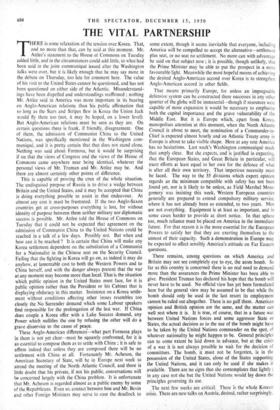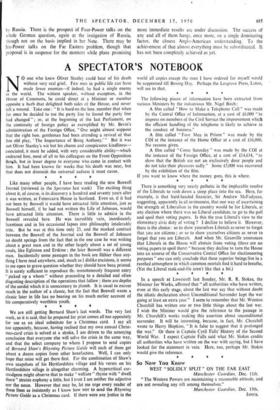THE VITAL PARTNERSHIP
THERE is some relaxation of the tension over Korea. That, and no more than that, can bp said at this moment. Mr. Attlee's statement to the House of Commons on Tuesday added little, and in the circumstances could add little, to what had been said in the joint communiqué issued after the Washington talks were over, but it is likely enough that he may say more in The debate on Thursday, too late for comment here. The value of his visit to the United States cannot be questioned, and has not been questioned on either side of the Atlantic. Misunderstand- ings have been dispelled and understandings reaffirmed ; nothing Mr. Attlee said in America was more important in its bearing on Anglo-American relations than his public affirmation that so long as the Stars and Stripes flew in Korea the Union Jack would fly there too (not, it may be hoped, on a lower level).
But Anglo-American relations must be seen as they are. On certain questions there is frank, if friendly, disagreement. One of them, the admission of Communist China to the United Nations, was specifically mentioned in the Washington com- muniqué, and it is pretty certain that that does not stand alone. Nothing was said about Formosa, but it would be surprising if on that the views of Congress and the views of the House of Commons came anywhere near being identical, whatever the personal views of Mr. Truman and Mr. Attlee may be. And there are almost certainly other points of difference.
This is capable of proving the crux of the whole situation. The undisguised pnrpose of Russia is to drive a wedge between Britain and the United States, and it may be accepted that China is doing everything possible to assist in that endeavour. At almost any cost it must be frustrated. If the two Anglo-Saxon countries get at cross-purposes everything is lost, for without identity of purpose between them neither military nor diplomatic success is possible. Mr. Attlee told the House of Commons on Tuesday that it could not be expected that agreement on the admission of ,China to the United Nations could be reached in a talk of a few days. Possibly not. But when and how can it be reached ? It is certain that China will make any Korea settlement dependent on the substitution of a Communist for a Nationalist in the Chinese seat on the Security Council. Failing that the fighting in Korea will go on, as indeed it may do , anyhow, at lamentable cost to both the Western Powers and to China herself, and with the danger always present that the war at any moment may become more than local. That is the situation which public opinion in the United States must face, for it is public opinion rather than the President or his Cabinet that is displaying obduracy in this matter. Insistence on a Korea settle- ment without conditions affecting other issues resembles too closely the No Surrender demand which some Labour speakers find responsible for the prolongation of the last war. If China does couple a Korea offer with a Lake Success demand, any Power which nullifies the one by refusing the other will do a grave disservice to the cause of pea e. These Anglo-American differences—what part Formosa plays in them is not yet clear—must be squarely confronted, for it is as essential to compose them as to settle with China ; it is safe to affirm indeed that unless they are composed there will be no settlement with China at all. Fortunately Mr. Acheson, the American Secretary of State, will be in Europe next week to attend the meeting of the North Atlantic Council, and there is little doubt that his private, if not his public, conversations will be concerned largely with the China problem. It is unfortunate that Mr. Acheson is regarded almost as a public enemy by some of the Republicans. Even so, contact between him and Mr. Bevin and other Foreign Ministers may serve to ease the deadlock to some extent, though it seems inevitable that everyone, including America will be compelled to accept the alternative—settlement plus seat, or no seat no settlement. No more can with advantage be said on that subject now ; it is possible, though unlikely, that the Prime Minister may be able to put the prospect in a more favourable light. Meanwhile the most hopeful means of achieving the desired Anglo-American accord over Korea is to strengthen Anglo-American accord in other fields.
That means primarily Europe, for unless an impregnable defensive system can be constructed there successes irfany other quarter of the globe will be immaterial—though if resources were capable of more expansion it would be necessary to emphasise both the capital importance and the grave vulnerability of the Middle East. But it is Europe which, apart from Korea, monopolises attention at this moment, when the North Atlantic Council is about to meet, the nomination of a Commander-in- Chief is expected almost hourly and an Atlantic Treaty army in Europe is about to take visible shape. Here at any rate America has no hesitations. Last week's Washington communiqué made that amply clear. But she expects, and is justified in expecting, that the European States, and Great Britain in particular, will exert efforts at least equal to her own for the defence of what is after all their own territory. That imperious necessity must be faced. The way to the 55 divisions which expert opinion regards as the minimum compatible with safety has not been found yet, nor is it likely to be unless, as Field Marshal Mont- gomery was insisting this week, 'Western European countries generally are prepared to extend compulsory military service, where it has not already been so extended, to two years. Men are not everything. Equipment is at least as important, and in some cases harder to provide at short notice. In that sphere too, much reliance must be placed on America in the immediate future. For that reason it is the more essential for the European Powers to satisfy her that they are exerting themselves to the utmost of their capacity. Such a demonstration in Europe may be expected to affect sensibly America's attitude on Far Eastern questions.
There remains, among questions on which America and Britain may not see conipletely eye to eye, the atom bomb. So far as this country is concerned there is no real need to demand more than the assurances the Prime Minister has been able to give. President Truman has declared his hope that the bomb will never have to be used. No official view has yet been formulated here but the general view may be assumed to be that while the bomb should only be used in the last resort its employment cannot be ruled out altogether. There is no gulf there. American opinion and British opinion are the same, and the matter can well rest where it is. It is true, of course, that in a future war between United Nations forces and some aggressor State or States, the actual decision as to the use of the bomb might have to be taken by the United Nations commander on the spot, of whatever nationality he might happen to be. General principles can to some extent be laid down in advance, but at the crisis of a war it is not always possible to wait for the decision of committees. The bomb, it must not be forgotten, is in the possession of the United States, alone of the States supporting the United Nations, and it can only be used if she makes it available. There are no signs that she contemplates that lightly ; in any case not she but the United Nations would lay down the principles governing its use.
The next few. weeks are critical. There is the whole Korean crisis. There are new talks on Austria, desired, rather surprisingly,







































 Previous page
Previous page